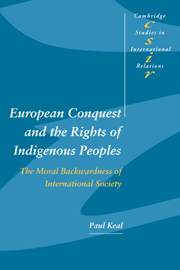 European Conquest and the Rights of Indigenous Peoples
European Conquest and the Rights of Indigenous Peoples Book contents
- Frontmatter
- Contents
- Acknowledgements
- Introduction
- 1 Bringing ‘peoples’ into international society
- 2 Wild ‘men’ and other tales
- 3 Dispossession and the purposes of international law
- 4 Recovering rights: land, self-determination and sovereignty
- 5 The political and moral legacy of conquest
- 6 Dealing with difference
- Conclusion
- Appendix
- Select bibliography
- Index
- CAMBRIDGE STUDIES IN INTERNATIONAL RELATIONS
4 - Recovering rights: land, self-determination and sovereignty
Published online by Cambridge University Press: 03 December 2009
- Frontmatter
- Contents
- Acknowledgements
- Introduction
- 1 Bringing ‘peoples’ into international society
- 2 Wild ‘men’ and other tales
- 3 Dispossession and the purposes of international law
- 4 Recovering rights: land, self-determination and sovereignty
- 5 The political and moral legacy of conquest
- 6 Dealing with difference
- Conclusion
- Appendix
- Select bibliography
- Index
- CAMBRIDGE STUDIES IN INTERNATIONAL RELATIONS
Summary
So far I have been concerned with the past and have deliberately used the broad term ‘non-Europeans’. The focus of this chapter shifts to the quest of contemporary indigenous peoples for the core right of self-determination. The bulk of non-European peoples that had been subjugated by European peoples achieved formal self-determination as a result of decolonisation following World War Two. Decolonisation did not, however, give self-determination to numerous indigenous peoples enclosed in new states such as India or Indonesia. For many of them decolonisation merely meant exchanging one set of colonial masters for another. In former colonies such as Australia, New Zealand and Canada, which had achieved independent status much earlier, it did nothing to change the situation of indigenous peoples who had been dispossessed of their lands and both lost control over their affairs and were often denied the full rights of citizenship. The loss of these was connected, in Chapter 3, with international law as a discourse that aided and justified the dispossession of land and rights, but it can no longer be viewed in this way. James Anaya shows that international law now ‘includes a certain universe of norms and procedures that benefit indigenous peoples’. It now challenges the legacy of dispossession ‘and the forces that would see it continue’. The displacement of natural by positive law, also noted in Chapter 3, established states as the subjects of international law and gave individuals a place mainly as citizens of states.
- Type
- Chapter
- Information
- European Conquest and the Rights of Indigenous PeoplesThe Moral Backwardness of International Society, pp. 113 - 155Publisher: Cambridge University PressPrint publication year: 2003


